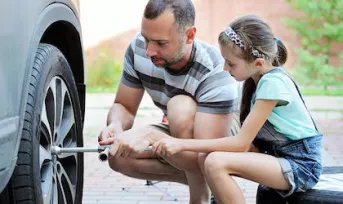
10 Essential Summer Safety Tips to Keep Cool
As summer sets in and the temperatures rise, it’s important to take extra precautions to keep yourself and your loved ones safe. High temperatures, prolonged sun exposure, and outdoor activities can pose various risks, but with the right knowledge and preparation, you can enjoy a fun and safe summer.
Here are essential summer safety tips to help you navigate the season responsibly.
1. Stay hydrated
Drinking plenty of water is crucial, especially in the summer heat. Aim for at least 8-10 glasses a day to stay properly hydrated. It helps to carry a reusable water bottle with you and refill it regularly.
Snacking on water-rich fruits and vegetables like watermelon, cucumber, and oranges can also help you stay hydrated.
2. Protect your skin from the sun
Choose a broad-spectrum sunscreen with at least SPF 30 and apply it 15-30 minutes before sun exposure. Reapply every two hours, or more often if swimming or sweating.
Wearing protective clothing such as wide-brimmed hats and UV-protective sunglasses can also help shield yourself from the sun. Even with these protective measures, limit your time outdoors or seek shade between 10 AM and 4 PM when the sun’s rays are strongest.
3. Summer safety for kids
Keeping kids safe in the summer involves making sure they stay hydrated and applying sunscreen frequently.
While you should supervise any outdoor play, it’s important to teach kids how to swim and ensure they understand and follow swimming pool and beach safety rules.
Tip: The American Red Cross is a great resource to find a swim class and lessons near you.
>RELATED: 31 Budget-Friendly Summer Activities for Kids
4. Summer pet safety
Just like children, pets need special care in the summer heat. Provide plenty of water and shade, especially for very young or very old pets that are more prone to heatstroke. Any cat or dog that exhibits excessive panting, drooling, and lethargy should be treated immediately.
Also, be mindful of hot surfaces like asphalt, which can burn their paws. Training them to wear booties can ensure their safety and comfort.
>RELATED: How to Get Help Paying for Vet Bills
5. Recognize and treat heat exhaustion
Knowing the symptoms of heat-related illnesses in humans, such as heavy sweating, nausea, and rapid pulse, is crucial.
If you suspect someone is suffering from heat exhaustion or heatstroke, immediately move them to a shaded or air-conditioned place. Once they’re out of the heat, provide water or an electrolyte sports drink, slightly elevate their legs, and apply cool compresses.
Call 911 if they are unable to drink any water, faint, or become confused or agitated.
6. Practice safe outdoor activities
Follow guidelines for safe swimming, hiking, and sports activities. Always supervise children during these activities and use appropriate safety gear such as life jackets, helmets, and sturdy shoes.
Choosing cooler times of the day for outdoor activities can help avoid peak heat and reduce the risk of heat-related issues.
7. Prevent insect bites and stings
Summer brings out pesky insects like mosquitoes, bees, and ticks. To keep them at bay, use insect repellents containing DEET or other effective ingredients.
It’s also a good idea to brush up on first aid for bites and stings, just in case. Having the right supplies handy means you can quickly deal with any bites or stings that happen, keeping everyone more comfortable.
8. Practice outdoor food safety
Whether you’re planning a tailgate, neighborhood block party, or picnic, it’s important to do all you can to prevent food-borne illnesses.
For starters, keep raw and cooked foods separately to avoid cross-contamination. Be mindful of safe grilling practices, which include cooking meats to appropriate internal temperatures.
When transporting and serving food outdoors, keep perishables at safe temperatures with coolers and ice packs. Remember to replenish ice as needed until you can properly refrigerate any leftovers.
9. Travel safely
Traveling safely in the summer involves being prepared. Pack a safety essentials kit for road trips that includes water, electrolyte drinks or tablets, snacks, and a first aid kit. If possible, keep a smaller insulated lunch tote or cooler within reach.
Remember to wear sunglasses and stay cool and hydrated. Don’t worry about drinking too much water, as those extra rest stops provide ample opportunity to stretch your legs and avoid fatigue.
10. Prepare your home and family for emergencies
Make sure both your home and family are ready for unexpected emergencies.
Keep your home cool by using fans, air conditioning, and blocking out sunlight with blinds or curtains. Assemble a summer emergency kit with essentials like water, non-perishable food, flashlights, and batteries. Ensure everyone in the family knows emergency contact numbers.
Stay safe and enjoy your summer!
By following these essential summer safety tips, you can ensure a fun and safe season for yourself, your family, and your pets. Stay hydrated, protect your skin, and practice safe outdoor activities to enjoy all that summer has to offer while keeping everyone safe and healthy.
Summer safety FAQs
1. What are some tips for staying cool during a heatwave?
- Stay indoors during peak heat hours.
- Use fans and air conditioning to keep your home cool.
- Wear lightweight, loose-fitting clothing.
- Follow summer heat safety tips to prevent overheating.
2. How can I ensure my children are safe while playing outside in the summer?
- Keep them hydrated and reapply sunscreen frequently.
- Supervise their activities, especially around water.
- Teach them about heat exhaustion signs and encourage breaks in the shade.
- Emphasize summer safety for kids by setting clear rules and guidelines.
3. What should I include in a summer emergency kit?
- Water and non-perishable food.
- Flashlights and extra batteries.
- A first aid kit and any necessary medications.
- Prepare for summer heat safety tips by including items to stay cool.
4. How can I keep my pets cool during hot weather?
- Provide plenty of fresh water and access to shade.
- Avoid taking them out during the hottest parts of the day.
- Never leave them in a parked car, even with the windows cracked.
- Incorporate summer pet safety measures to ensure their well-being.
5. What are the signs of heat exhaustion and how can I treat it?
- Symptoms include heavy sweating, nausea, and dizziness.
- Move the person to a cool place, provide water, and apply cool compresses.
- Seek medical attention if symptoms persist or worsen.
Notice: Information provided in this article is for informational purposes only. Consult your attorney or financial advisor about your financial circumstances.


